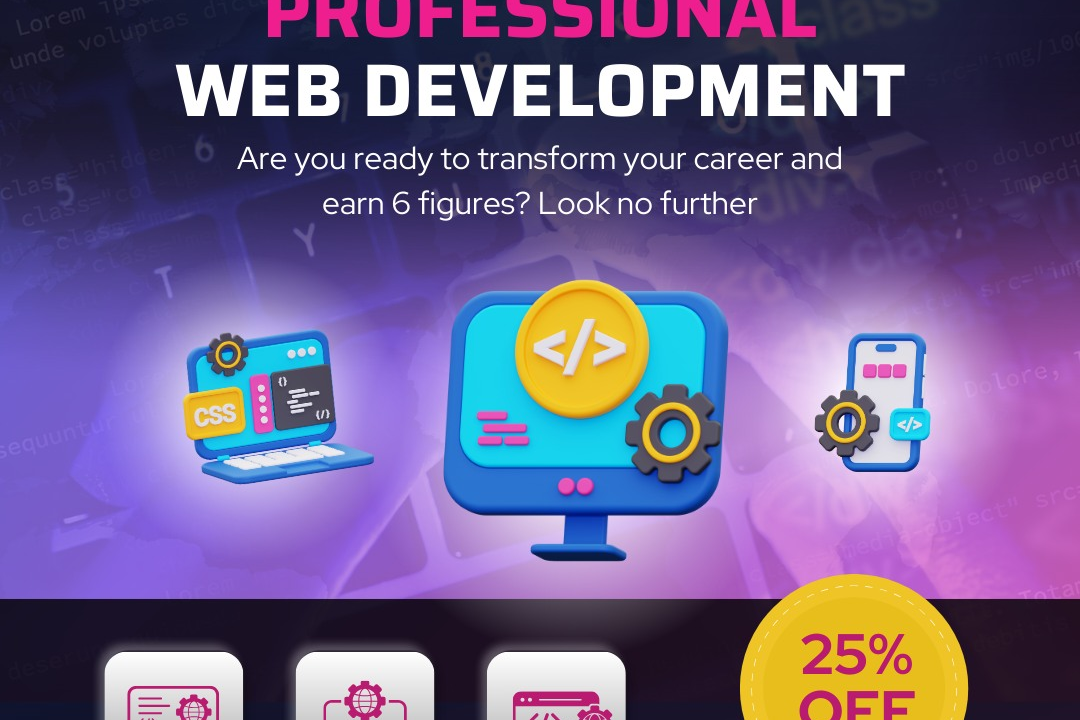Formula Based Programs For Add In Php
Formula-based programs for addition in PHP are those that utilize dynamic formulas or expressions to
Formula Based Programs For Add In Php
Formula-based programs for addition in PHP are useful because they enable dynamic and flexible calculations by allowing the addition operation to be defined through customizable formulas. This approach is especially beneficial in scenarios where the calculation logic may change frequently or depend on complex conditions, such as financial formulas or real-time data processing. By leveraging formulas, developers can create adaptable code that simplifies maintenance and enhances scalability, ensuring that different calculation rules can be easily integrated without extensive code modifications.
To Download Our Brochure: https://www.justacademy.co/download-brochure-for-free
Message us for more information: +91 9987184296
Formula based programs for addition in PHP are useful because they enable dynamic and flexible calculations by allowing the addition operation to be defined through customizable formulas. This approach is especially beneficial in scenarios where the calculation logic may change frequently or depend on complex conditions, such as financial formulas or real time data processing. By leveraging formulas, developers can create adaptable code that simplifies maintenance and enhances scalability, ensuring that different calculation rules can be easily integrated without extensive code modifications.
Course Overview
The ‘Formula-Based Programs for Add in PHP’ course provides a comprehensive understanding of implementing dynamic addition operations using formulas in PHP. It covers fundamental concepts, practical techniques, and real-world applications, enabling learners to create flexible, formula-driven calculations for various projects. This course is ideal for developers seeking to enhance their PHP skills with advanced, customizable arithmetic functionalities.
Course Description
The ‘Formula-Based Programs for Add in PHP’ course teaches you how to implement dynamic addition operations using formulas in PHP, enabling flexible arithmetic calculations for real-world applications.
Key Features
1 - Comprehensive Tool Coverage: Provides hands-on training with a range of industry-standard testing tools, including Selenium, JIRA, LoadRunner, and TestRail.
2) Practical Exercises: Features real-world exercises and case studies to apply tools in various testing scenarios.
3) Interactive Learning: Includes interactive sessions with industry experts for personalized feedback and guidance.
4) Detailed Tutorials: Offers extensive tutorials and documentation on tool functionalities and best practices.
5) Advanced Techniques: Covers both fundamental and advanced techniques for using testing tools effectively.
6) Data Visualization: Integrates tools for visualizing test metrics and results, enhancing data interpretation and decision-making.
7) Tool Integration: Teaches how to integrate testing tools into the software development lifecycle for streamlined workflows.
8) Project-Based Learning: Focuses on project-based learning to build practical skills and create a portfolio of completed tasks.
9) Career Support: Provides resources and support for applying learned skills to real-world job scenarios, including resume building and interview preparation.
10) Up-to-Date Content: Ensures that course materials reflect the latest industry standards and tool updates.
Benefits of taking our course
Functional Tools
1 - Integrated Development Environments (IDEs): Tools like PHPStorm, Visual Studio Code, and Sublime Text are essential for writing, editing, and managing PHP code efficiently. These IDEs offer features such as syntax highlighting, code completion, debugging support, and real time error detection, which significantly enhance productivity. They provide an organized workspace that allows students to manage multiple files and projects seamlessly. Familiarity with IDEs also prepares students for professional development environments used in the industry, ensuring they can develop, test, and deploy PHP applications with ease and precision.
2) Local Server Environments: Tools like XAMPP, WAMP, or MAMP simulate a server environment on students' local machines. They bundle Apache, MySQL, and PHP, allowing students to run PHP scripts locally without the need for a live server. These environments are vital for testing and debugging formula based programs in real time. They enable students to create a development environment that closely mimics real world deployment scenarios. Learning to set up and use local servers equips students with practical skills for managing web hosting environments and conducting comprehensive testing before deployment.
3) Version Control Systems (VCS): Git, along with platforms like GitHub or GitLab, forms a critical part of the development toolkit. Students learn to track changes in their code, collaborate with peers, and maintain different versions of their projects. Version control encourages best practices for code management, enabling rollback to earlier versions if needed and handling merge conflicts efficiently. Mastery of VCS tools promotes disciplined coding habits, facilitates teamwork, and prepares students for collaborative development in professional settings, ensuring their projects are well organized and maintainable.
4) Database Management Tools: phpMyAdmin, MySQL Workbench, or HeidiSQL are used to design, manage, and interact with databases. Since formula based PHP programs often involve data storage and retrieval, understanding database tools is crucial. These tools provide intuitive interfaces for creating and managing tables, running SQL queries, and visualizing data relationships. They enable students to develop dynamic applications that leverage database logic, ensuring their formulas can be applied effectively within data driven environments. Working with these tools also prepares students for integrating PHP with robust data management systems in real world projects.
5) Debugging and Profiling Tools: Xdebug and PHP Debug Bar are powerful debugging tools that allow students to identify, analyze, and resolve errors in their code efficiently. These tools offer features such as step through debugging, variable inspection, and performance profiling. Debugging is a critical skill in developing reliable formula based applications, as it ensures calculations and logic are implemented correctly. Using these tools helps students understand code execution flow, optimize performance, and maintain high quality standards in their projects, ultimately fostering a professional approach to problem solving.
6) Documentation and Collaboration Platforms: Confluence, Notion, or Markdown editors facilitate documenting code, formulas, and project workflows. Proper documentation helps in understanding the structure of formulas and the logic behind computations, making it easier to troubleshoot or update programs later. These platforms enable students to collaborate effectively with team members, share notes, and maintain versioned project documentation. Emphasizing documentation skills prepares students for real world software development where clear communication, knowledge sharing, and project transparency are vital for success.
7) Online Learning Resources and Forums: Websites like Stack Overflow, PHP.net, W3Schools, and official PHP documentation serve as continuous learning and troubleshooting tools. They provide extensive examples, best practices, and community support for resolving coding issues. Students are encouraged to leverage these resources for certifications, advanced learning, and staying up to date with evolving PHP features. Engaging with online communities fosters independent problem solving skills, keeps learning dynamic, and ensures students remain connected with industry standards and innovations.
8) Testing and Validation Tools: PHPUnit and other testing frameworks help students write and run automated tests for their formula based PHP applications. Testing ensures that formulas produce accurate results under various scenarios and input values. These tools support test driven development, which improves code quality and reliability. Incorporating testing tools into training helps students understand the importance of validation, reduces bugs, and prepares them for maintaining high standard software in professional environments, where accuracy and robustness are critical.
9) Front End Development Tools: Libraries and frameworks such as Bootstrap, jQuery, and Vue.js are instrumental in creating interactive and user friendly interfaces for PHP applications. These tools allow students to design responsive layouts, handle user interactions seamlessly, and enhance the overall user experience. Integrating front end development skills with PHP formula based programs enables the creation of comprehensive web solutions, making applications not only functional but also visually appealing and intuitive.
10) Code Quality and Linting Tools: Tools like PHP_CodeSniffer, ESLint (for JavaScript), and Prettier help maintain consistent coding styles and enforce best practices. These tools automatically analyze code for syntax errors, style violations, and potential bugs. Emphasizing code quality ensures that PHP programs with formulas are maintainable, readable, and less prone to errors, which is crucial in professional settings where team collaboration and code standards are essential.
11 - Continuous Integration/Continuous Deployment (CI/CD) Tools: Jenkins, GitHub Actions, or GitLab CI/CD pipelines automate the testing, building, and deployment processes. Integrating CI/CD practices into certification projects helps students understand how to automate workflows, ensure code stability with automated tests, and deploy PHP applications efficiently. This knowledge prepares students for real world environments where rapid deployment and reliable updates are mandatory.
12) Cloud Platforms and Hosting Services: Platforms like AWS, Azure, or shared hosting providers give students insights into deploying their PHP applications in live environments. Understanding cloud deployment, configuration, and scaling prepares students to manage real world projects at scale. They learn best practices for securing applications, managing server resources, and monitoring performance, which are vital skills in today's cloud driven industry.
13) API Testing and Integration Tools: Postman and Insomnia facilitate testing and developing RESTful APIs that PHP applications often consume or expose. These tools help students simulate API requests, validate responses, and ensure integration points are working correctly. Mastery of API testing ensures that PHP formulas interact correctly with other systems, enabling the creation of versatile and interconnected applications.
14) Performance Monitoring Tools: New Relic, Datadog, or Blackfire enable students to monitor application performance in real time. These tools identify bottlenecks, track resource usage, and provide insights for optimization. Understanding performance tuning ensures PHP applications with formulas run efficiently, delivering better user experiences and scalability in production environments.
15) Learning Management and Practice Platforms: Interactive coding platforms like Codecademy, LeetCode, or HackerRank provide additional practice environments to hone PHP skills and formula logic. These platforms offer challenges, quizzes, and real time feedback, supplementing formal certification courses. They foster continuous learning, problem solving, and mastery of PHP programming fundamentals necessary for complex formula development.
16) Security Tools and Best Practices: Tools like OWASP ZAP, security scanners, and secure coding guidelines help students learn how to identify vulnerabilities in PHP applications. Given the importance of data integrity and protection, incorporating security considerations into formula based applications ensures robust, safe, and compliant solutions. Understanding security best practices prepares students for real world challenges involving sensitive data handling and application defense.
17) Workflow Automation Tools: Use of task runners like Gulp or Grunt can optimize development workflows, automate repetitive tasks such as minification, compilation, or testing. Streamlining the development process boosts productivity and ensures consistent build processes for PHP projects involving formulas. Students learn to adopt efficient development pipelines, leading to faster project turnaround times.
18) Multimedia and Visualization Tools: Incorporating tools for data visualization such as Chart.js, D3.js, or Google Charts helps illustrate complex formula outputs graphically. Visual representations can make formulas easier to understand, debug, and present to stakeholders. This integration enhances the communicative aspect of PHP applications, especially when formulas are used for analytical or reporting purposes.
By integrating these additional tools and platforms, JustAcademy ensures comprehensive training that covers every aspect of modern PHP development with formulas, preparing students to excel in diverse professional environments.
Browse our course links : https://www.justacademy.co/all-courses
To Join our FREE DEMO Session:
This information is sourced from JustAcademy
Contact Info:
Roshan Chaturvedi
Message us on Whatsapp:
Email id: info@justacademy.co











